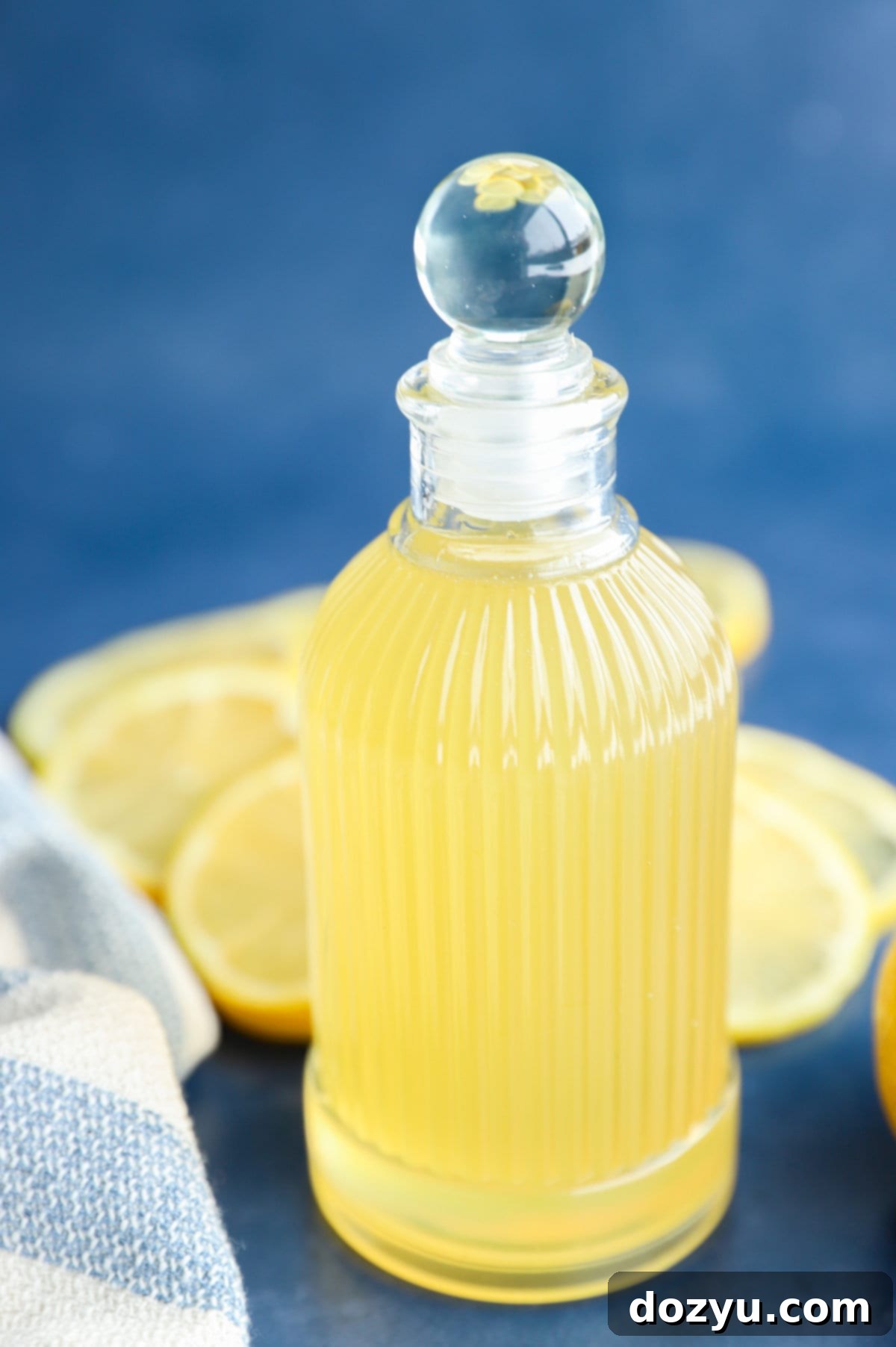Zesty Homemade Lemon Simple Syrup: Your Essential Guide to Citrus-Infused Sweetness
Unlock a world of vibrant flavor with homemade lemon simple syrup! This refreshing, easy-to-make elixir strikes the perfect balance of bright, tangy citrus and delicate sweetness, designed to elevate an array of culinary creations. From sophisticated cocktails and invigorating beverages to delectable desserts and breakfast delights, this versatile syrup is your secret ingredient for infusing dishes with an irresistible lemony twist. Discover how effortless it is to craft this kitchen staple and transform your everyday recipes into extraordinary experiences.
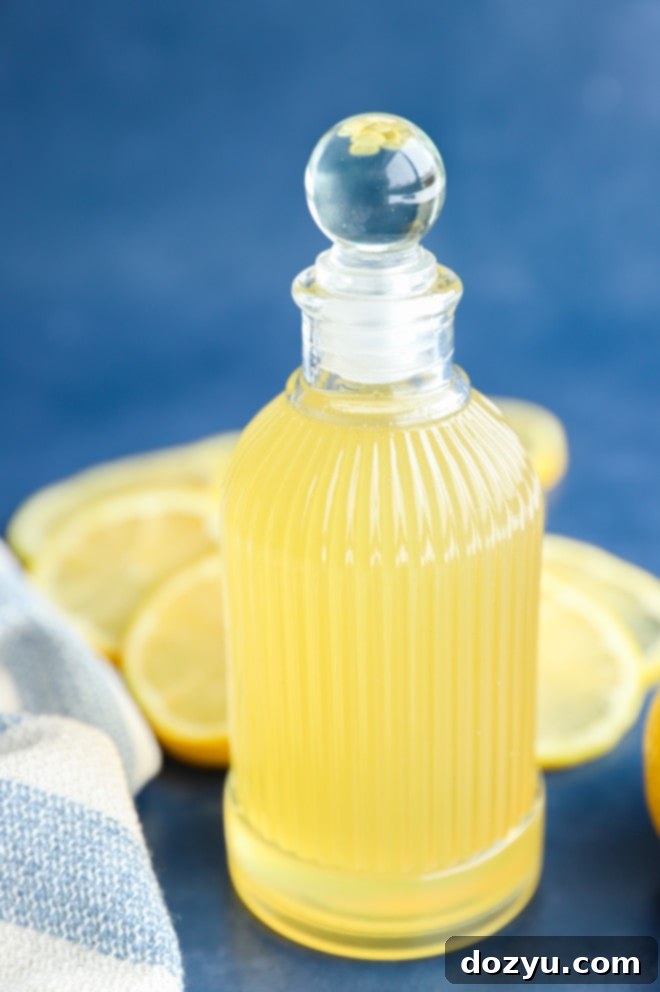
table of contents
Toggle
About This Homemade Lemon Simple Syrup
There’s nothing quite like the bright, invigorating flavor of fresh lemon to awaken your taste buds. This homemade lemon simple syrup is designed to harness that natural zest and sweetness, providing an effortless way to enhance your everyday cooking, baking, and lemon cocktail mixing. It’s a fundamental ingredient that offers unparalleled versatility and elevates even the simplest dishes.
As an avid home cook and enthusiast of vibrant flavors, I firmly believe that a touch of acidity is crucial in almost any dish. My refrigerator rarely lacks at least two lemons, patiently awaiting their moment to shine. It’s truly astonishing how a modest squeeze of fresh lemon juice or a sprinkle of fragrant lemon zest can transform a recipe, lifting it to an entirely new level of deliciousness. This lemon simple syrup captures that essence, concentrating the vibrant lemon flavor into a convenient liquid form.
While lemons typically reach their peak ripeness during the winter months, their widespread availability year-round in the United States means you can prepare this delightful syrup at any time. This allows you the flexibility to incorporate its bright, citrusy notes into your seasonal recipes, whether it’s summer refreshments, autumn desserts, or cozy winter beverages. Its universally appealing flavor profile ensures it will pair beautifully with a wide array of ingredients and cuisines.
Throughout this comprehensive guide, I’ve outlined numerous creative ways to utilize this homemade lemon simple syrup, along with essential tips and tricks to ensure you achieve the best possible results. You can find these suggestions in the table of contents above or by simply scrolling down to the dedicated sections before the recipe card.
For those who love to experiment with flavors, consider customizing your lemon syrup by adding a few sprigs of fresh herbs during the simmering process. Fresh basil or thyme, for instance, can introduce wonderful herbaceous notes that beautifully complement the tart and sweet profile of the lemon, creating an even more complex and intriguing syrup.
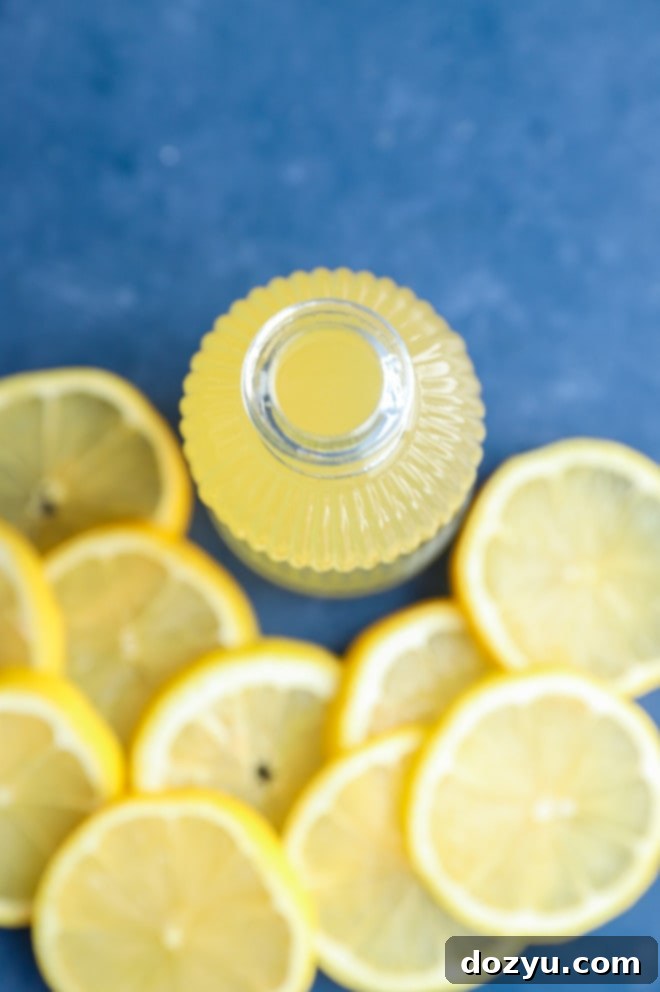
What Exactly is Lemon Simple Syrup?
At its core, lemon simple syrup is an elevated version of classic simple syrup, infused with the bright, aromatic essence of fresh lemons. The basic simple syrup typically consists of equal parts sugar and water, heated until the sugar dissolves, forming a sweet liquid. Our lemon variation takes this foundation and enhances it by incorporating fresh lemon zest and juice, creating a syrup that is bursting with complex citrus flavor.
This simple yet potent elixir is incredibly versatile and quickly becomes a kitchen staple. It’s far more than just a sweetener; it’s a flavor enhancer that provides a delightful balance of tartness and sweetness. Unlike plain simple syrup, which offers only sweetness and moisture, lemon simple syrup delivers a refreshing zing that can brighten up a multitude of dishes and beverages. The beauty of this recipe lies in its simplicity and its longevity; once prepared, it can be stored in the refrigerator for an extended period, allowing you to have a burst of lemony goodness on hand whenever inspiration strikes.
In our kitchen, lemon simple syrup is a go-to ingredient for quickly elevating a dish or drink that feels like it’s missing something. That “something” is often a touch of vibrant, sweet-tart flavor that only fresh lemon can provide. It’s perfect for when you want to add a nuanced citrus note without the hassle of zesting and juicing a fresh lemon every single time.
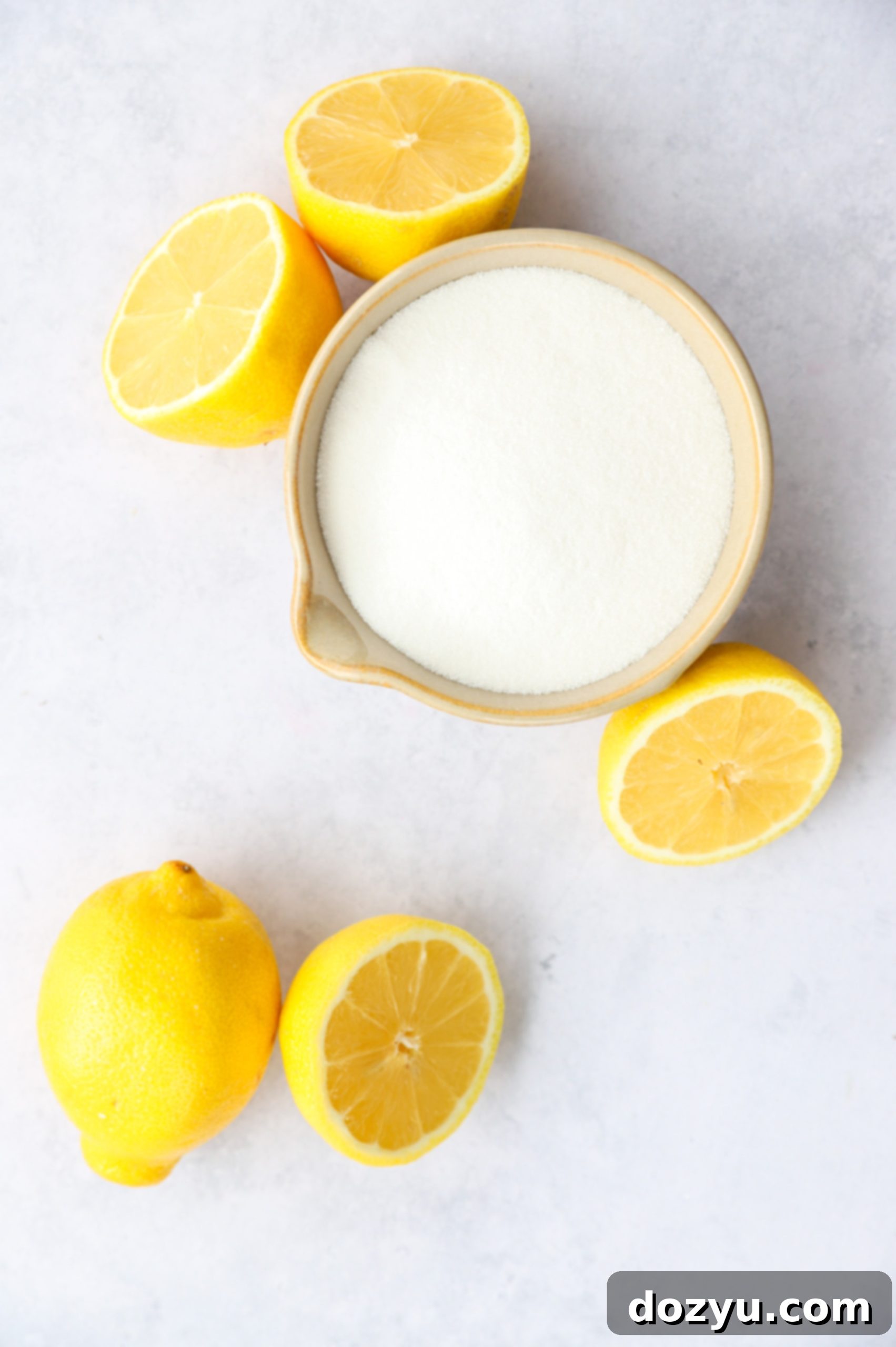
Key Ingredients for Your Lemon Syrup
Creating this flavorful lemon simple syrup requires just a few basic ingredients, each playing a crucial role in achieving that perfect balance of tart and sweet. The quality of your ingredients, especially the lemons, will directly impact the final flavor profile of your syrup.
- Lemons: For this recipe, I typically use 3 to 4 large, fresh lemons. I personally lean towards a more tart syrup, so I often utilize all the zest from four lemons to maximize the vibrant citrus punch. While standard Eureka or Lisbon lemons work beautifully, you could also experiment with Meyer lemons for a slightly sweeter, more floral note. It is highly recommended to use organic and unwaxed lemons whenever possible. This is particularly important because you will be using the zest, and unwaxed lemons ensure you’re not introducing unwanted chemicals into your syrup. Look for lemons with bright, unblemished skin and a firm feel, indicating they are juicy and fresh.
- Granulated Sugar: This recipe specifically calls for granulated sugar (also known as white sugar). Granulated sugar dissolves easily and creates a clear, bright syrup that truly lets the lemon flavor shine. Avoid using dark or light brown sugar, as their molasses notes would alter the intended clean, zesty flavor of the lemon syrup. The ratio of sugar to water is essential for both flavor and preservation.
- Water: The water acts as the solvent, allowing the sugar to dissolve and creating the liquid base for the syrup. While tap water is generally acceptable if it’s what you normally drink, I often opt for filtered water. Filtered water can ensure a cleaner, purer taste for your syrup, especially if your tap water has a strong mineral taste or odor that could potentially affect the delicate lemon flavor.
Essential Equipment You’ll Need
Fortunately, making homemade lemon simple syrup doesn’t require an arsenal of specialized kitchen gadgets. You likely already have most of these items on hand. The right tools simply make the process more efficient and help achieve a perfectly smooth, flavorful syrup.
- Saucepan: A small to medium-sized saucepan is essential for simmering the ingredients. Choose one with a heavy bottom to ensure even heat distribution and prevent scorching.
- Wooden Spoon or Heat-Resistant Spatula: This will be used for stirring the mixture to help the sugar dissolve and prevent it from sticking to the bottom of the pan. A wooden spoon or silicone spatula is ideal as it won’t scratch your saucepan.
- Microplane or Zester: To get the vibrant zest from your lemons, a microplane zester is indispensable. It allows you to remove just the brightly colored outer layer (the zest) without digging into the bitter white pith underneath.
- Citrus Juicer: Whether it’s a simple handheld reamer or a more elaborate countertop juicer, a tool to extract the fresh lemon juice efficiently and without seeds is crucial.
- Fine Mesh Strainer: After the syrup has steeped with the lemon zest, you’ll want to strain it to achieve a clear, smooth liquid. A fine mesh strainer will effectively separate the zest particles from the syrup.
- Mason Jar or Airtight Container: For proper storage in the refrigerator, you’ll need a clean, airtight container. Mason jars are excellent choices, not only for their sealing capabilities but also for their aesthetic appeal if you plan to gift the syrup or display it.
Simple Syrup Favorites
cast iron saucepan
Buy Now →
fine mesh strainers
Buy Now →
mason jars
Buy Now →
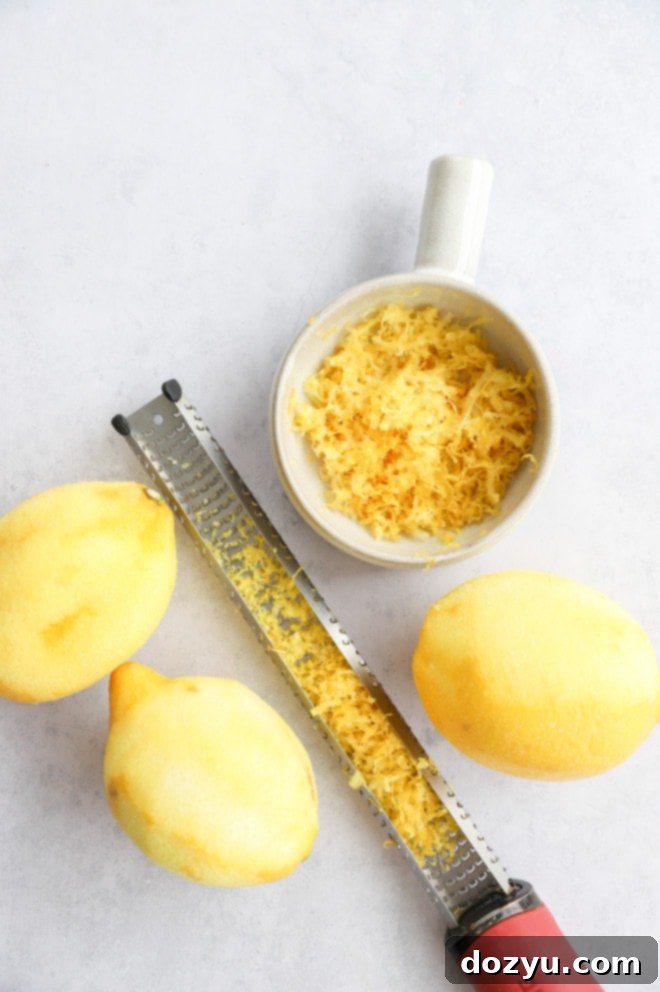
Crafting Your Lemon Simple Syrup: Step-by-Step
Making homemade lemon simple syrup is surprisingly quick and straightforward, requiring minimal effort for maximum flavor payoff. Follow these simple steps to create your own batch of this versatile citrus elixir.
Zest and Juice Your Lemons
The first crucial step is to extract the rich, aromatic zest from your lemons. Using a microplane or a fine grater, carefully remove only the bright yellow outer layer of the lemon peel. Be sure to avoid grating into the white pith underneath, as this part is bitter and can impart an undesirable flavor to your syrup. Set the collected lemon zest aside, as it will be added later to infuse the syrup with its intense oils.
Once zested, proceed to juice the lemons. You’ll need approximately 1/2 cup of fresh lemon juice for this recipe. Use a citrus juicer or reamer to extract as much juice as possible. It’s important to strain the juice through a small sieve or use a juicer with a built-in strainer to ensure that any seeds or large pulp pieces are removed, resulting in a smooth, clear syrup.
Gently Simmer for Perfection
Combine the freshly squeezed lemon juice, water, and granulated sugar in a small saucepan. Place the saucepan over medium heat. As the mixture heats, stir it occasionally with a wooden spoon or heat-resistant spatula. The goal here is to gently dissolve the sugar completely into the liquid, forming a clear syrup. This process should take approximately 5 minutes. You’ll know it’s ready when you can no longer see any sugar crystals at the bottom of the pan or clinging to your spoon. Avoid bringing the mixture to a rolling boil, as this can cause too much water to evaporate, altering the syrup’s consistency and concentration.
Cool and Strain for Clarity
Once the sugar has fully dissolved, remove the saucepan from the heat. Now, add the reserved lemon zest into the hot syrup. The heat from the syrup will help extract the essential oils and intense lemon flavor from the zest. Allow the mixture to sit undisturbed for about 20 minutes, giving the zest ample time to infuse its aromatic properties into the syrup as it cools slightly.
After the infusion period, it’s time to strain the syrup. Pour the syrup through a fine mesh strainer into a clean, heat-proof container. This step removes all the lemon zest, leaving you with a beautifully clear, golden-hued lemon simple syrup. For optimal results and safety, allow the syrup to cool completely to room temperature before transferring it to an airtight storage container. Cooling thoroughly prevents condensation from forming inside your storage jar, which could introduce excess moisture and shorten the syrup’s shelf life.
Expert Tips for Simple Syrup Success
While making lemon simple syrup is inherently simple, a few expert tips can ensure your batch is absolutely perfect every time, maximizing flavor and extending its shelf life.
- Don’t Forget to Thoroughly Clean Your Lemons: Since the zest is a key component of this recipe, it’s paramount to clean your lemons properly. Wash them thoroughly under cool running water, gently scrubbing the skin to remove any dirt, pesticides, or wax. Pat them completely dry with a clean towel before zesting. This ensures you’re infusing only pure lemon goodness into your syrup.
- Control the Bitterness: When zesting, always aim to remove only the yellow part of the peel and avoid the white pith directly underneath. The pith contains bitter compounds that can negatively impact the delicate flavor of your syrup. A good quality microplane zester makes this task much easier.
- Adjust for a Thicker Syrup (2:1 Ratio): The standard simple syrup ratio is 1:1 (one part sugar to one part water). If you desire a thicker, more viscous syrup—perfect for drizzling over pancakes, waffles, or ice cream, similar to maple syrup—you can easily adjust the ratio to 2:1 (two parts sugar to one part water). Simply double the amount of sugar while keeping the water constant, then proceed with the recipe instructions. The increased sugar concentration will result in a richer, denser syrup.
- Always Use Fresh Lemons: For the most vibrant and authentic lemon flavor, fresh lemons are an absolute must. Bottled lemon juice or dried zest simply won’t yield the same bright, complex taste. The recipe relies on both the aromatic oils from the fresh zest and the tangy juice, so choosing ripe, juicy lemons is critical.
- Infusion Time Matters: Allowing the lemon zest to steep in the hot syrup as it cools is key to a deep, robust flavor. Don’t rush this step. The longer the zest infuses (within reason, about 20-30 minutes), the more concentrated and intense the lemon flavor will become.
- Cool Completely Before Storing: Always allow your simple syrup to cool completely to room temperature before transferring it to a sealed container and refrigerating. Storing warm syrup can create condensation inside the container, which introduces excess moisture and can lead to premature spoilage.
More tasty simple syrup recipes: Strawberry Simple Syrup | Lavender Simple Syrup | Cherry Simple Syrup | Cinnamon Simple Syrup
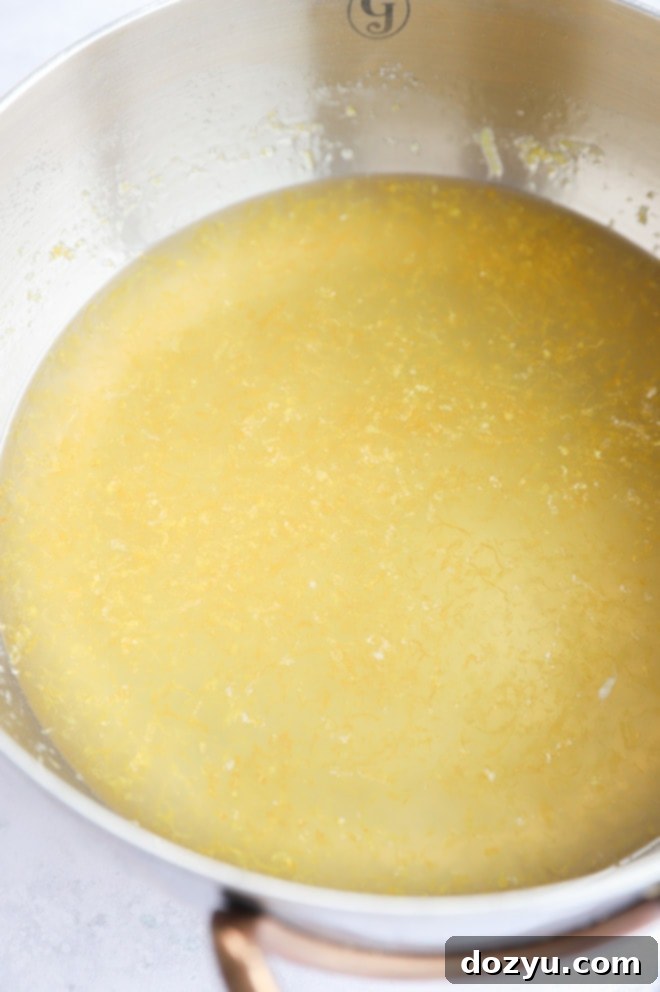
Do You Need to Refrigerate Simple Syrup?
Yes, absolutely. Refrigerating simple syrup is a non-negotiable step to ensure its safety and extend its shelf life. Simple syrup, especially one made with fresh fruit components like lemon, is a sugar solution that can become a breeding ground for bacteria and mold if left at room temperature.
The high sugar content in simple syrup acts as a preservative to some extent, but it’s not enough to prevent spoilage outside of cold temperatures. By storing your lemon simple syrup in the refrigerator, you significantly slow down the growth of microorganisms that cause fermentation and spoilage. If you were to leave it out at room temperature, even for a day or two, you would quickly notice signs of spoilage, such as cloudiness or an off-smell, as bacteria begin to metabolize the sugar.
Proper refrigeration, in a tightly sealed container, will allow your homemade lemon simple syrup to last for up to two months, sometimes even longer. This makes it a convenient component to prepare in advance for your various culinary and mixology needs.
How to Use Lemon Simple Syrup on Cakes
Lemon simple syrup is a secret weapon for any baker looking to elevate their cakes. It serves a dual purpose: not only does it impart a wonderful burst of fresh lemon flavor, but it also significantly improves the moisture content and texture of your baked goods. This is particularly beneficial for cakes that can sometimes dry out, like sponge cakes or those that have been refrigerated.
The application is incredibly simple: once your cake layers are baked and fully cooled, use a basting brush or a pastry brush to gently brush the lemon simple syrup onto the surfaces of the cake. For layered cakes, focus on brushing the syrup between each cake layer before you add your frosting. This allows the syrup to soak into the cake, creating a more tender crumb and infusing it with that delightful lemony essence.
This technique is ideal for a wide variety of cakes that can benefit from a bright, citrusy lift. Think vanilla cakes, lemon drizzle cakes, yogurt cakes, bundt cakes, pound cakes, or any cake where a refreshing lemon flavor would be a welcome addition. The syrup adds an extra layer of flavor and moisture that transforms a good cake into an unforgettable one, making each bite more flavorful and tender.
Can You Freeze Homemade Lemon Syrup?
Absolutely, homemade lemon simple syrup freezes beautifully! Freezing is an excellent option if you’ve made a larger batch than you anticipate using within a couple of months, or if you simply want to ensure you always have some on hand without worrying about spoilage. It’s a fantastic way to preserve its fresh, vibrant flavor for even longer.
To freeze, the easiest method is to pour the completely cooled lemon simple syrup into clean, food-grade plastic ice cube trays. This creates convenient, pre-portioned cubes that are easy to thaw as needed. Once the syrup is fully frozen into solid cubes, pop them out of the trays and transfer them to a freezer-safe plastic bag or an airtight freezer container. Label the container with the date, and your frozen lemon simple syrup will keep well for up to 3 months.
When you’re ready to use it, simply take out the desired number of syrup cubes and place them in a small bowl or container. Thaw them overnight in the refrigerator. Once thawed, the syrup will be ready to use in your favorite cocktails, desserts, or beverages, just as if it were freshly made. This freezing method makes homemade lemon simple syrup a truly versatile and convenient ingredient to have in your culinary arsenal.

How Much Syrup Does This Recipe Yield?
Following this recipe carefully will yield a generous amount of delicious lemon simple syrup. Specifically, this recipe makes approximately 1 1/2 cups of lemon simple syrup. This quantity is quite versatile and provides a substantial supply for various applications.
To put this into perspective for common uses, particularly in beverages, a typical serving size ranges from 1/2 ounce to 1 ounce of simple syrup per drink. Based on these measurements, your 1 1/2 cups of syrup (which is equivalent to 12 fluid ounces) will provide approximately 12 to 24 individual servings. This means you can enjoy numerous cocktails, sweeten multiple pitchers of iced tea, or moisten several cakes with a single batch, making it an incredibly efficient and economical homemade ingredient.
How to Tell if Your Simple Syrup Has Gone Bad
Even with proper refrigeration, simple syrup does eventually spoil. It’s a natural process, especially for syrups infused with fresh ingredients. Knowing the signs of spoilage is crucial to ensure you’re always using fresh, safe ingredients in your culinary creations.
The most common and definitive sign that your simple syrup has gone bad is a change in its appearance. Freshly made simple syrup should be clear and translucent. If you observe that the mixture has turned cloudy or opaque, this is a strong indication that fermentation has begun. This cloudiness is often due to the growth of yeast or bacteria, which consume the sugar and produce alcohol and carbon dioxide.
Other signs of spoilage can include:
- Off-smell: A sour, yeasty, or otherwise unpleasant odor that wasn’t present when the syrup was fresh.
- Bubbles: Small bubbles forming in the syrup, particularly if it hasn’t been recently shaken or moved, can also suggest fermentation.
- Mold: Although less common with simple syrup stored correctly, any visible mold growth (fuzzy spots of various colors) on the surface or inside the syrup is a clear sign to discard it immediately.
At the first sign of any of these changes, it is best to err on the side of caution and discard the syrup. Never consume simple syrup that shows signs of spoilage to avoid potential health risks. Regular checks of your stored syrup will help you keep your pantry and refrigerator stocked with only the freshest ingredients.
Need more inspiration for cocktail hour? Check out my cocktail recipes page!
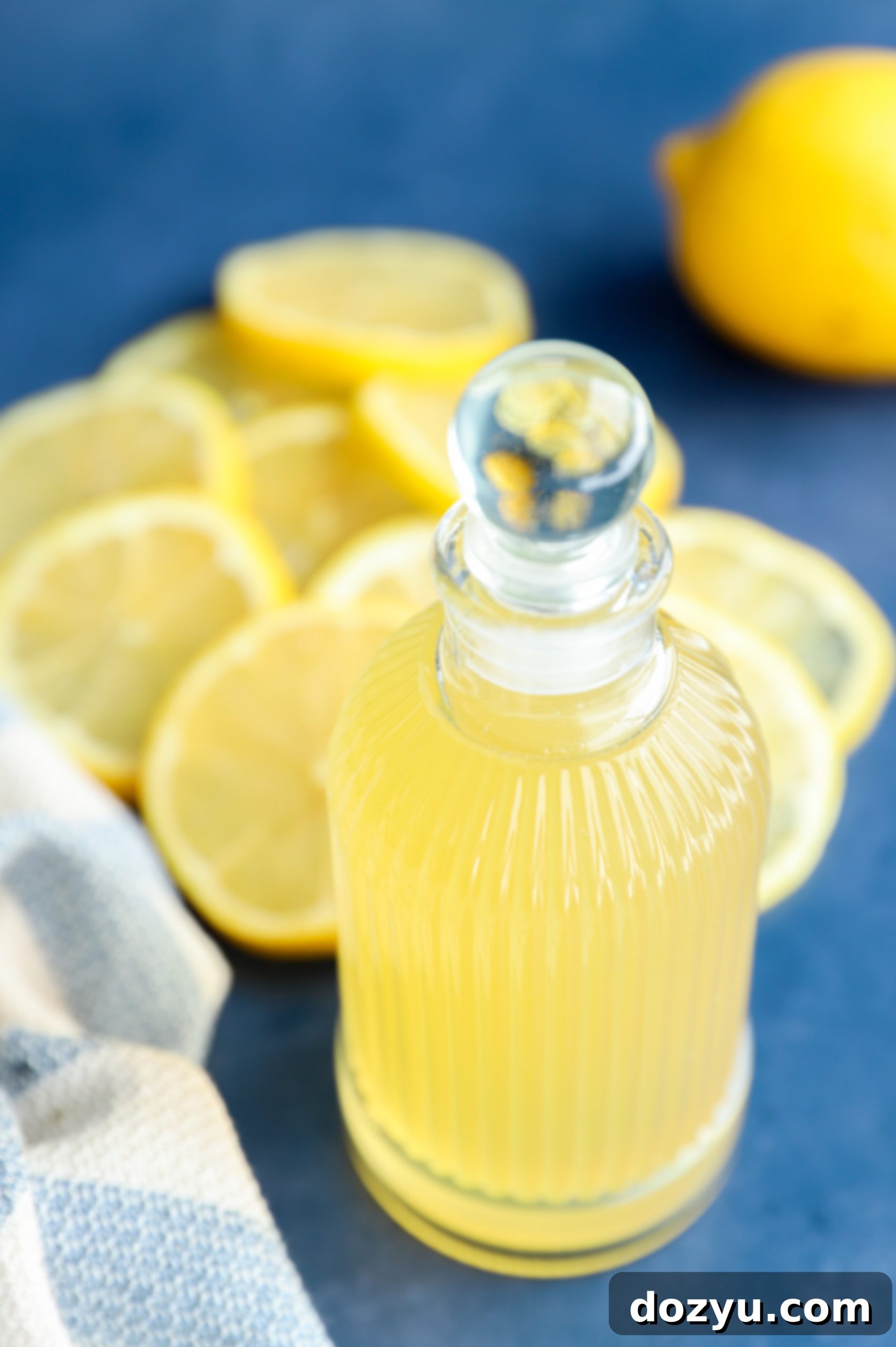
Versatile Uses for Lemon Simple Syrup
The beauty of homemade lemon simple syrup lies in its incredible versatility. With its perfectly balanced sweet and tart profile, it’s a game-changer for enhancing a wide array of drinks, breakfasts, and desserts. Here are some of my personal favorite and most popular ways to incorporate this delicious syrup into your culinary repertoire:
- Elevate Cocktails: Lemon simple syrup is a must-have for any home bartender. Use it as a direct substitute for regular simple syrup in any cocktail where a hint of lemon would be welcome. It’s fantastic in a classic lemon drop martini, margaritas, gin fizzes, or a whiskey sour, adding both sweetness and bright citrus.
- Sweeten Beverages: Transform ordinary drinks into refreshing delights. Stir the syrup into freshly brewed lemonade or iced tea for an instant burst of zesty sweetness. It’s also wonderful in sparkling water with a wedge of fresh lemon for a quick, homemade lemon soda.
- Dessert Glazes and Drizzles: Create brilliant glazes for fruit tarts, breakfast pastries, scones, or cakes. A simple brush of this syrup over a baked good adds shine, moisture, and an extra layer of flavor. Drizzle it over fresh fruit salads for a subtle sweetness and tang that enhances the natural fruit flavors.
- Macerate Berries: Gently macerate fresh berries (strawberries, blueberries, raspberries) in a bowl with a spoonful of lemon simple syrup. This draws out their natural juices, creating a luscious sauce perfect for topping ice cream, yogurt, or shortcakes.
- Breakfast Enhancer: Take your breakfast to the next level by drizzling the syrup generously over warm pancakes, waffles, French toast, or crepes. It’s a bright alternative to maple syrup and pairs wonderfully with fresh fruit.
- Moisten Cakes: As discussed, brush the syrup onto cooled cake layers before frosting. This not only infuses the cake with delightful lemon flavor but also keeps it incredibly moist and extends its freshness. It’s particularly good for pound cake, bundt cake, or delicate sponge cakes.
- Flavor Fruit Salads: Add a few drops to your favorite fruit salad recipe. It harmonizes the flavors of different fruits and prevents browning in certain fruits like apples and bananas.
- Savory Applications: Don’t limit yourself to sweet dishes! Lemon simple syrup can be a surprising addition to marinades for chicken, fish, or vegetables, offering a subtle sweetness and acidity that tenderizes and flavors the ingredients. Consider it as an alternative to honey or agave in certain savory preparations.
For more specific recipe ideas, try swapping this lemon syrup for the simple syrup in a raspberry margarita for a citrusy twist. Alternatively, use it in place of agave in this lemon margarita to infuse it with homemade goodness. For dessert lovers, brushing the tops of the cakes for this mixed berry vanilla bean cake with the syrup before frosting will add an irresistible brightness and moisture.
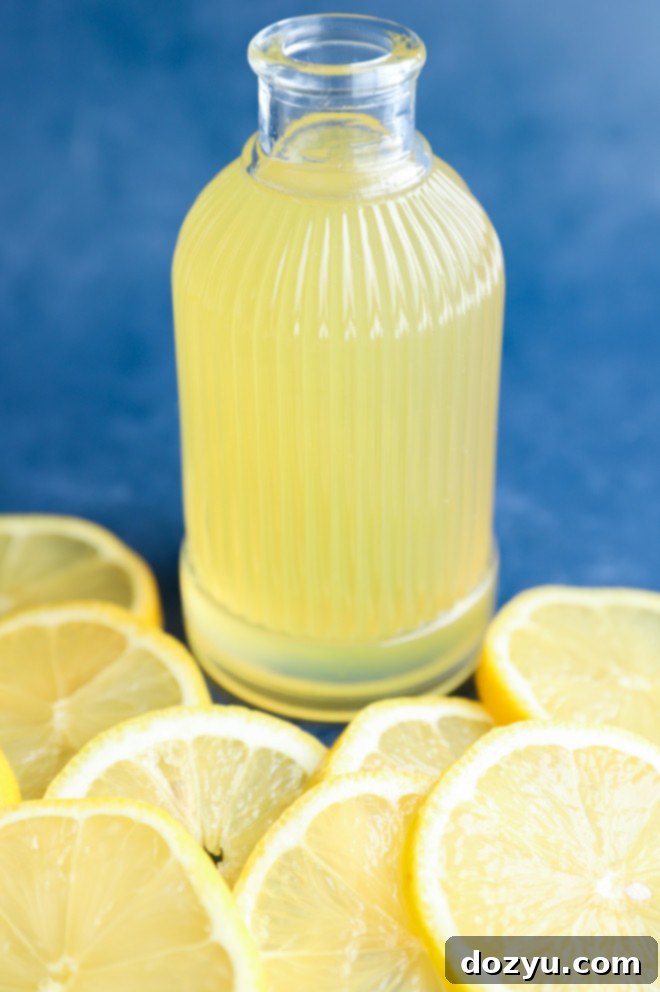
Storing and Freezing Your Lemon Simple Syrup
Proper storage is key to preserving the freshness and extending the life of your homemade lemon simple syrup. Follow these guidelines to ensure your syrup remains delicious and safe to use for as long as possible.
Store in the Refrigerator:
Always allow your lemon simple syrup to cool completely to room temperature before storing it. Once cooled, transfer the syrup to a clean, airtight glass jar (such as a mason jar) or a suitable plastic container. Store the sealed container in the refrigerator. When stored correctly in the fridge, your lemon simple syrup will maintain its quality for up to 2 months. It is crucial never to leave simple syrup at room temperature, as this drastically accelerates spoilage and bacterial growth.
Freezing for Long-Term Storage:
If you’ve made a large batch or want to keep your lemon simple syrup fresh for an even longer period, freezing is an excellent option. For convenient portioning, pour the cooled syrup into ice cube trays. Once the cubes are fully frozen and solid, remove them from the trays and transfer them to a freezer-safe plastic bag or an airtight freezer container. Label with the date. Frozen lemon simple syrup can be stored in the freezer for up to 3 months without losing its flavor or quality.
Thawing Frozen Syrup:
When you’re ready to use your frozen lemon simple syrup, simply remove the desired number of cubes from the freezer. Place them in a small bowl or container and thaw them overnight in the refrigerator. Avoid thawing at room temperature for food safety reasons. Once thawed, the syrup will have its original consistency and be ready to use in any recipe calling for lemon simple syrup.
To ensure the best possible flavor for this recipe, select the freshest lemons available! Look for lemons that are firm, heavy for their size, and have a bright, vibrant yellow skin. Avoid any lemons with soft spots, mushy textures, or green discoloration, as these indicate they are either old or not fully ripe. Shriveled or dry-looking lemons on the outside will also yield less juice and less concentrated essential oils in their zest, which are crucial for the intense lemon flavor you want in your syrup. A good quality lemon will feel plump and emit a lovely citrus aroma when lightly scratched.
Finally, if you take the time to make this incredible homemade lemon simple syrup recipe, please consider leaving a rating or a comment below! I genuinely love hearing about your culinary adventures and how these recipes come to life in your kitchens. I make an effort to respond to every single comment, so don’t hesitate to drop any questions you might have as well!
Oh, and for an extra special touch, be sure to tag me on Instagram if you share your creations! Seeing these recipes enjoyed in your homes is truly my favorite part, and I absolutely adore looking through all your wonderful photos. Your feedback and shares mean the world to me!

Lemon Simple Syrup Recipe
Equipment
-
Measuring Cups
-
Le Creuset Saucepan
-
Fine Mesh Strainers
-
Mason Jars
Ingredients
- 3 to 4 lemons
- 1/2 cup water
- 1 cup granulated sugar
Instructions
-
Carefully remove the zest from the lemons using a microplane or fine grater, ensuring you avoid the white pith. Set the zest aside.
-
Juice the zested lemons until you have a total of 1/2 cup of fresh lemon juice. Strain to remove any seeds or large pulp.
-
In a small saucepan, combine the fresh lemon juice, water, and granulated sugar. Stir gently to combine all ingredients. Place the saucepan over medium heat and cook, stirring occasionally, until the sugar completely dissolves, which should take about 5 minutes. Do not bring to a rolling boil.
-
Remove the saucepan from the heat and immediately stir in the reserved lemon zest. Let the syrup sit undisturbed and cool slightly for approximately 20 minutes to allow the zest to infuse its flavor.
-
Strain the syrup through a fine mesh strainer into a clean container to remove the lemon zest. Ensure the syrup cools completely to room temperature before using or storing.
